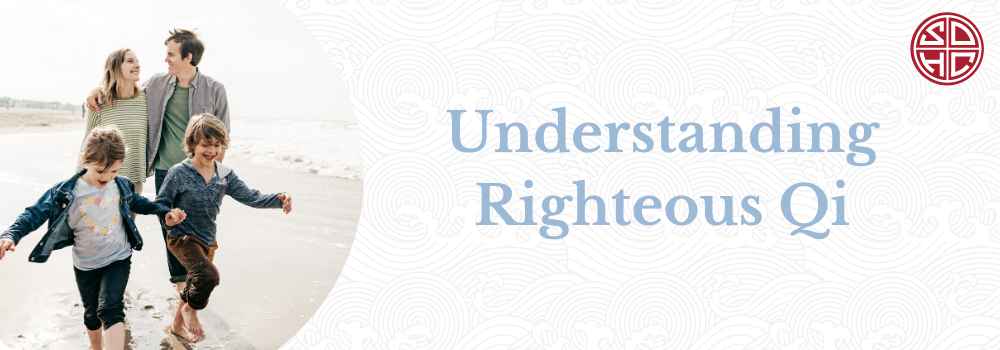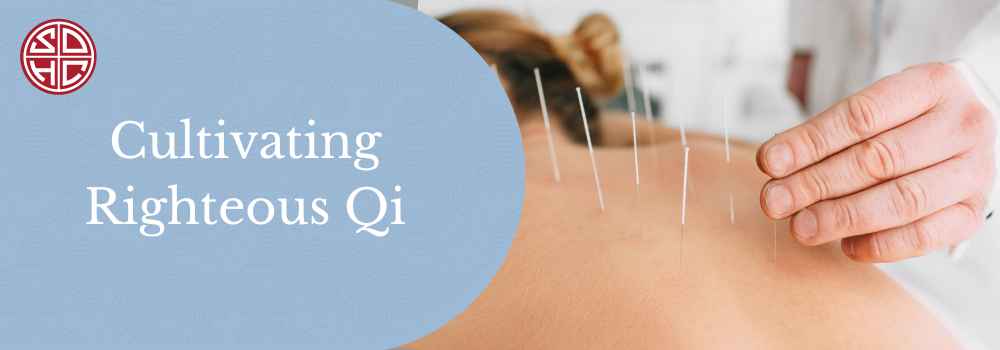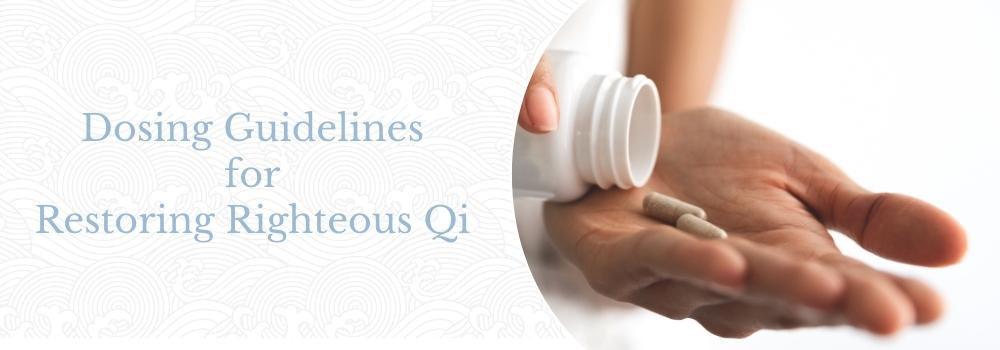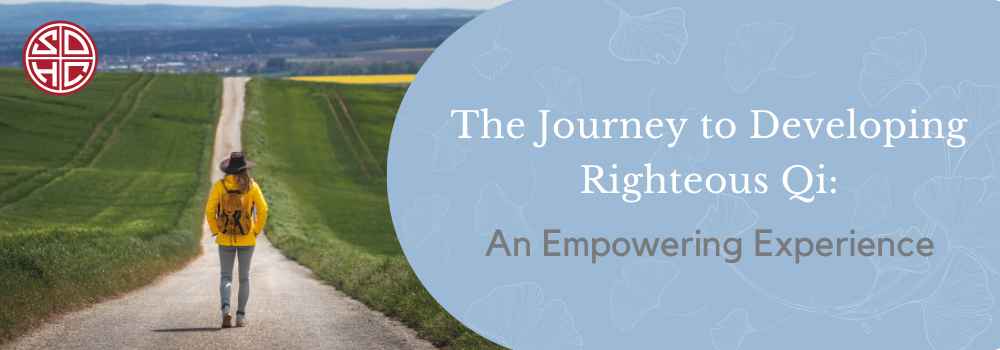
Our renowned, safe and restorative herbal supplement, Cold Snap, has been a staple in the retail market since 1994. With its powerful blend of 20 herbs, our tagline "Restore Righteous Chi" highlights the formula's ability to cultivate an essential concept in Traditional Chinese Medicine (TCM) known as righteous qi.

Understanding Righteous Qi
The term qi, also spelled as chi, can be broadly translated as "energy" or "function." In TCM theory, qi is one of the five vital substances, alongside blood (xue), body fluids (jinye), essence (jing), and spirit (shen). Qi serves as the driving force behind the body's energetic and physiological functions, playing a crucial role in maintaining overall health. TCM recognizes various subcategories or types of qi that contribute to our well-being, often assessed diagnostically in relation to organ health. To delve deeper into the imbalances in qi that can lead to health issues, please refer to our informative articles on liver qi stagnation and spleen qi deficiency.
Righteous qi, also referred to as zheng qi, serves as a protective shield, defending and supporting optimal bodily functions. It is a combination of two other subcategories of qi: yuan qi, the intrinsic qi bestowed upon us at birth, and zong qi, which circulates within our bloodstream. Consequently, the strength of our righteous qi is influenced by both genetic factors and the innate constitution we possess. As the Su Wen, an ancient TCM text, states, "If the zheng qi remains strong, xie qi cannot invade the body. Zheng qi must be weak when invasion of the xie qi takes place." Xie qi is defined as "evil forces" by ancient scholars. However, righteous qi is also linked to the qi acquired throughout our lifetime, comparable to the zong qi within our blood.

Innate Immune System versus Adaptive Immune System
In the realm of Western medicine, the immune system is categorized into two parts: the innate and adaptive immune systems. The innate immune system is present from birth and is regulated by genetics, similar to yuan qi in TCM. It represents the constitutional foundation we possess. Additionally, humans and other "jawed vertebrates" possess an adaptive, or acquired, immune system. This system develops over time as we encounter various pathogens in our environment, creating an immunological memory that guides our body's response upon subsequent exposure to the same pathogen. Our acquired immune system is approximate to zong qi in TCM.
While TCM does not have direct translations for the Western medical definitions of the immune system and its components, the concept of righteous qi closely aligns with and encompasses both aspects of the Western perspective of the immune system.

Addressing Immune System Dysfunction
Dysfunction in the innate immune system is generally attributed to genetic factors, genetic mutations, or the activation of genes that limit the response capacity of the innate immune system when exposed to pathogens. For instance, Chronic Inflammatory Response Syndrome (CIRS), known as Gu Syndrome in TCM, manifests as an immunological syndrome in individuals genetically susceptible to pathogenic exposure. Such individuals struggle to effectively detoxify pathogens, resulting in debilitating systemic inflammation. CIRS represents a dysfunction of the innate immune system, characterized by uncontrolled inflammatory responses across multiple organ systems.
On the other hand, the adaptive immune system develops and evolves as we encounter a wide array of pathogens in our environment. Its functionality is influenced by various factors such as sleep, diet, lifestyle choices, and the frequency of exposure to specific pathogens. Many individuals experience allergic reactions when their adaptive immune system overreacts to everyday pathogens. In complex conditions like CIRS/Gu syndrome, dysfunction can occur in both aspects of the immune system.

Cultivating Righteous Qi
In TCM, dysfunctional immune responses are often attributed to a deficiency of righteous qi. Similar to addressing any deficiency, strengthening righteous qi is possible with the right tools. While TCM practitioners do not claim that rebuilding righteous qi can "cure" specific diseases or conditions, the benefits of doing so can have far-reaching effects. TCM, including herbal medicine, can be viewed as a collection of tools that guide our bodies in appropriately responding to environmental pathogens, akin to the immunological memory of the adaptive immune system. TCM equips our bodies with the necessary tools to respond rather than react to the pathogens we encounter.
Although consulting a knowledgeable TCM professional is ideal, several simple tools are available for evaluating the state of qi within our bodies, such as tongue examination. Additionally, cultivating qi can be achieved through physical practices like tai chi and receiving acupuncture. In our herbal supplements store, we offer formulas designed for convenient and effective home use. Therefore, we naturally recommend our formula Cold Snap, which comprises 20 herbs specifically chosen to restore righteous qi. These practitioner-designed formulas are modern interpretations of classic herbal remedies and can be safely used without professional guidance.

Dosing Guidelines for Restoring Righteous Qi
The most effective strategy for building righteous qi using Cold Snap involves a gradual and steady approach, akin to pacing oneself for a marathon rather than a sprint. The practical implementation of this strategy varies depending on the individual. For highly sensitive individuals, starting with one capsule per day or opting for the powdered version of Cold Snap, which allows for very low doses with maximum absorption, is recommended. The dosage can be gradually increased as the body tolerates and effectively utilizes more. Many customers have reported cumulative benefits from a daily maintenance dose of just two capsules, while others choose to take two capsules three times a day. Commitment to the chosen approach is key.
By following the aforementioned strategy, the need to consume a large quantity of herbs within a short period can be avoided. However, there are instances when adjusting the dosage of Cold Snap to smaller, more frequent doses over a brief duration may be necessary. This is particularly relevant when the body experiences a sudden onset of symptoms, often associated with a cold or flu, but relevant to any situation where your qi feels compromised. It is important to note that we never recommend exceeding 24 capsules in a day for adults and 8 capsules for children under 12.

The Journey to Developing Righteous Qi: An Empowering Experience
Cultivating strong righteous qi empowers our bodies to respond appropriately to environmental pathogens. In a world full of people who have recently experienced much uncertainty regarding how our bodies respond to new pathogens, we at encourage you to adopt a responsive rather than reactive approach and take action to enhance your righteous qi.
Be the first to know about new articles and special offers. Follow us on Instagram and Facebook or subscribe to our emails at the bottom of the page.







Leave a comment
This site is protected by reCAPTCHA and the Google Privacy Policy and Terms of Service apply.